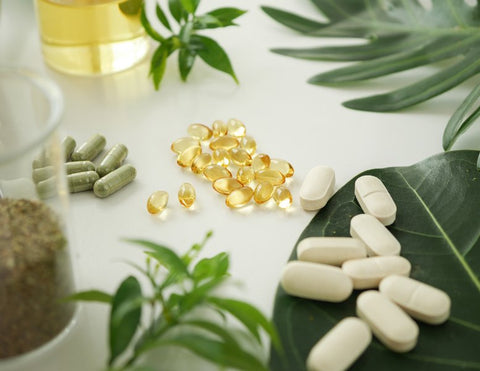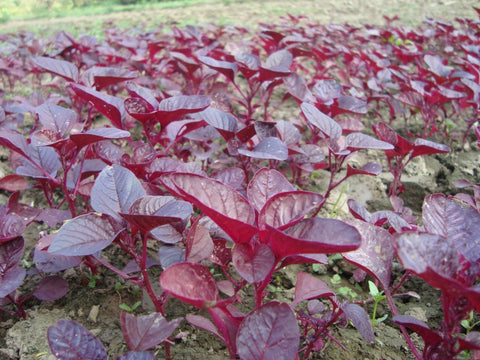7 Herbs and Vitamins to Avoid with High Blood Pressure
High blood pressure impacts 116 million adults in the United States alone. While many people take medication to control blood pressure, some make dietary changes, too. However, it is crucial to be discerning with these changes because there are certain herbs and vitamins to avoid with high blood pressure.
Below is a list of herbs and vitamins that have been thoroughly studied and should be avoided by anyone with high blood pressure.
The 7 Herbs and Vitamins to Avoid with High Blood Pressure

Certain herbs, vitamins, and minerals may have substantial health benefits, yet for those with high blood pressure, they can have adverse effects. A few of the things to consider:
Vitamin D
While there is conflicting evidence of vitamin D’s impact on blood pressure, studies show that people with low vitamin D sometimes also struggle with blood pressure issues. This could be because vitamin D is a key vitamin that indirectly modulates blood pressure.
A systematic review and meta-analysis found that in studies totaling over 25,000 people, supplementation with vitamin D didn’t impact blood pressure. The main difference could be in older or obese individuals with low vitamin D levels; this is where a correlation with high blood pressure has been found.
Another possible reason vitamin D is on the list of vitamins to avoid with high blood pressure is that as a kind of steroid hormone, it promotes the absorption of calcium in the body. Low calcium levels are associated with hypertension, as studied on populations with low calcium diets. One way to get vitamin D 100% naturally is via sunlight which also boosts nitric oxide. As a result, people deficient in this key vitamin only need 10 to 15 minutes of sun exposure to boost vitamin D production.
Arnica
Arnica is an herb in the sunflower family that’s native to the northern U.S., Siberia, Canada, and Europe. Traditionally, it was used to treat injuries and pain, but today, there are various arnica supplements that are available in diluted forms for ingestion.
Moderation is key; taking large amounts of undiluted arnica can cause a number of severe side effects, including high blood pressure, vomiting, shortness of breath, elevated heart rate, rashes, and more.
Guarana
Guarana is often included in lists of foods that give you energy and is a popular ingredient in energy drinks. The plant, which is native to the Amazon, contains caffeine as well as theobromine and theophylline (both of which are similar to caffeine).
Caffeine and caffeine-like substances can increase the heart rate and, consequently, increase blood pressure. Research has shown that guarana and ephedra supplements, even when taken as directed, can increase blood pressure and heart rate.
A beetroot supplement may serve as a healthy alternative to guarana and other energy-boosting supplements. The naturally occurring nitrate in beetroot can help increase energy levels by boosting nitric oxide while nourishing the body with essential vitamins and minerals - offering sustained energy throughout the day without the crash.
Licorice
Licorice root is considered one of the oldest herbal remedies and has long been used in numerous cultures around the world to treat a wide variety of ailments, as evidenced by ethnobotany examinations that dive into its rich history.
The root is believed to be plentiful in antioxidants and has anti-inflammatory and antimicrobial effects. More research is needed to back these claims, but that has not stopped people from taking licorice supplements to help with digestion and other ailments.
The main active compound in licorice is glycyrrhizin. Glycyrrhizin gives the plant a sweet taste, but it may also have antimicrobial, antioxidant, and anti-inflammatory effects.
Although licorice may have some potential uses, those with high blood pressure may want to steer clear of this root. Research has shown that even low doses can significantly increase blood pressure.
Ephedra
Ephedra is an herb that grows in arid to semi-arid regions of the world and is most notably known for its dangerous reactions, which in rare cases may include:
- Strokes
- Seizures
- Heart attacks
The herb causes blood pressure elevation and quickening heartbeat, especially if caffeinated ephedra is taken. These herbal supplements are often used for weight loss. When taken in doses of 150mg, ephedra has been shown to cause a significant increase in both blood pressure and heart rate.
Avoiding caffeine and any type of fat-burning supplement is ideal for people with high blood pressure. Smarter food and dietary choices can have a major impact on regulating blood pressure.
St. John’s Wort
St. John’s Wort is a popular herb often used to aid in treating depression.
Additionally, St. John’s Wort has been used topically to treat wounds.
The herb may be helpful for some individuals, but St. John’s Wort has been associated with some severe side effects and potentially dangerous drug interactions. Notably, St. John’s Wort has been shown to increase blood pressure.
Studies indicate that St. John’s Wort may interfere with some blood pressure medications, making them less effective. Anyone taking blood pressure medication or suffering from hypertension may want to avoid St. John’s Wort unless otherwise instructed by a healthcare professional.
Sodium
Sodium is a mineral found in many multivitamins. So while it is not technically one of the vitamins to avoid with high blood pressure, it is listed because it is important to be mindful of. Sodium is found in many foods and is responsible for nerve and muscle function.
Too much sodium is linked to elevated blood pressure levels. Lowering consumption can help bring down blood pressure levels and improve vascular function.
Sodium in quantities less than 1,500 mg daily is acceptable for most people with high blood pressure. Larger quantities of salt can lead to water retention, which is known to put added stress on a the heart and blood vessels.
Consuming too much sodium is common in today’s world with highly processed foods. A mere teaspoon of salt contains 2,400 mg of sodium. Instead, avoid using table salt and opt for foods that are low sodium or sodium-free. A great alternative to salt is miso paste which has lower sodium levels and a similar taste.

The list of vitamins to avoid with high blood pressure is short, but there are plenty of herbs and minerals that can be avoided. Natural dietary supplements, such as a beetroot supplement or red spinach supplement, can safely be adopted for boosting nitric oxide in a healthy and sustainable way.
References:
Hypertension Prevalence in the U.S. | Million Hearts®. (2021, March 22). Centers for Disease Control and Prevention. https://millionhearts.hhs.gov/data-reports/hypertension-prevalence.html
Mehta, V., & Agarwal, S. (2017). Does Vitamin D Deficiency Lead to Hypertension?. Cureus, 9(2), e1038. https://doi.org/10.7759/cureus.1038
Witham MD, Nadir MA, Struthers AD. Effect of vitamin D on blood pressure: a systematic review and meta-analysis. J Hypertens. 2009 Oct;27(10):1948-54. doi: 10.1097/HJH.0b013e32832f075b. PMID: 19587609.
Team, H. A. V. (2020, December 17). High Blood Pressure? Don’t Take Vitamin D for It. Cleveland Clinic. https://health.clevelandclinic.org/high-blood-pressure-dont-take-vitamin-d-for-it-video/
Haller CA, Jacob P, Benowitz NL. Short-term metabolic and hemodynamic effects of ephedra and guarana combinations. Clin Pharmacol Ther. 2005 Jun;77(6):560-71. doi: 10.1016/j.clpt.2005.01.023. PMID: 15961987.
Sigurjónsdóttir HA, Franzson L, Manhem K, Ragnarsson J, Sigurdsson G, Wallerstedt S. Liquorice-induced rise in blood pressure: a linear dose-response relationship. J Hum Hypertens. 2001 Aug;15(8):549-52. doi: 10.1038/sj.jhh.1001215. PMID: 11494093.
Wang, L., Yang, R., Yuan, B., Liu, Y., & Liu, C. (2015). The antiviral and antimicrobial activities of licorice, a widely-used Chinese herb. Acta pharmaceutica Sinica. B, 5(4), 310–315. https://doi.org/10.1016/j.apsb.2015.05.005
Persky, A. M., Berry, N. S., Pollack, G. M., & Brouwer, K. L. (2004). Modelling the cardiovascular effects of ephedrine. British journal of clinical pharmacology, 57(5), 552–562. https://doi.org/10.1111/j.1365-2125.2003.02062.x
Vukovich MD, Schoorman R, Heilman C, Jacob P 3rd, Benowitz NL. Caffeine-herbal ephedra combination increases resting energy expenditure, heart rate and blood pressure. Clin Exp Pharmacol Physiol. 2005 Jan-Feb;32(1-2):47-53. doi: 10.1111/j.1440-1681.2005.04152.x. PMID: 15730434.
St. John’s Wort: Benefits, Side Effects & More. (n.d.). Cleveland Clinic. https://my.clevelandclinic.org/health/articles/9304-st--johns-wort
St. John’s wort. (n.d.). Mount Sinai Health System. https://www.mountsinai.org/health-library/herb/st-johns-wort
Grillo, A., Salvi, L., Coruzzi, P., Salvi, P., & Parati, G. (2019). Sodium Intake and Hypertension. Nutrients, 11(9), 1970. https://doi.org/10.3390/nu1109197
He, Silu BS∗; Hao, Xiyuan MS The effect of vitamin D3 on blood pressure in people with vitamin D deficiency, Medicine: May 2019 - Volume 98 - Issue 19 - p e15284 doi: 10.1097/MD.0000000000015284
Kim, M. H., Bu, S. Y., & Choi, M. K. (2012). Daily calcium intake and its relation to blood pressure, blood lipids, and oxidative stress biomarkers in hypertensive and normotensive subjects. Nutrition research and practice, 6(5), 421–428. https://doi.org/10.4162/nrp.2012.6.5.421
Miller AD, Ly BT, Clark RF. Neonatal hemolysis associated with nursing mother ingestion of Arnica tea [abstract 120]. Clin Toxicol 2009;47(7):726.
https://www.nccih.nih.gov/health/licorice-root
Vukovich, M. D., Schoorman, R., Heilman, C., Jacob, P., 3rd, & Benowitz, N. L. (2005). Caffeine-herbal ephedra combination increases resting energy expenditure, heart rate and blood pressure. Clinical and experimental pharmacology & physiology, 32(1-2), 47–53. https://doi.org/10.1111/j.1440-1681.2005.04152.x
Cui, Y. H., & Zheng, Y. (2016). A meta-analysis on the efficacy and safety of St John's wort extract in depression therapy in comparison with selective serotonin reuptake inhibitors in adults. Neuropsychiatric disease and treatment, 12, 1715–1723. https://doi.org/10.2147/NDT.S106752





Comments (0)
There are no comments for this article. Be the first one to leave a message!